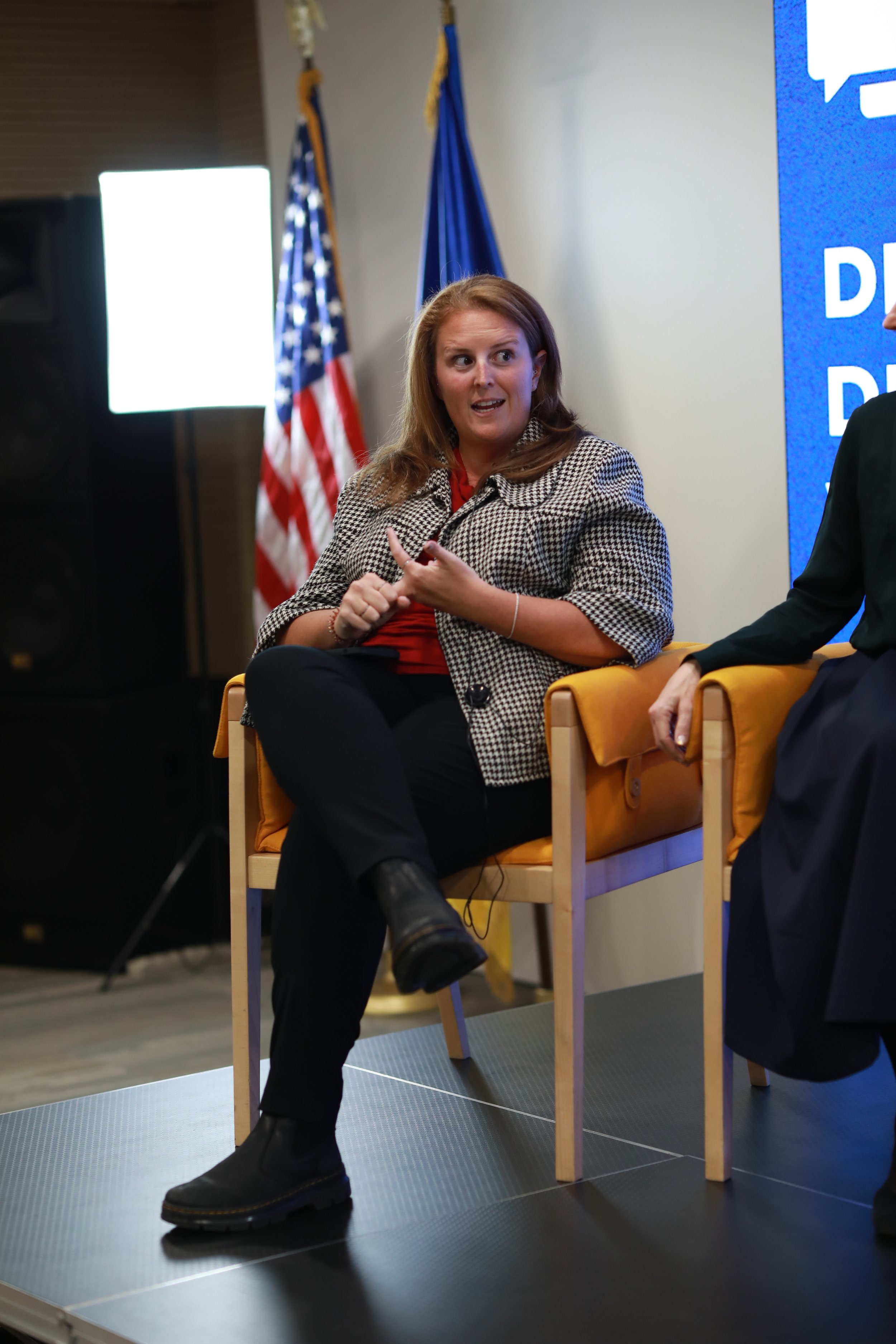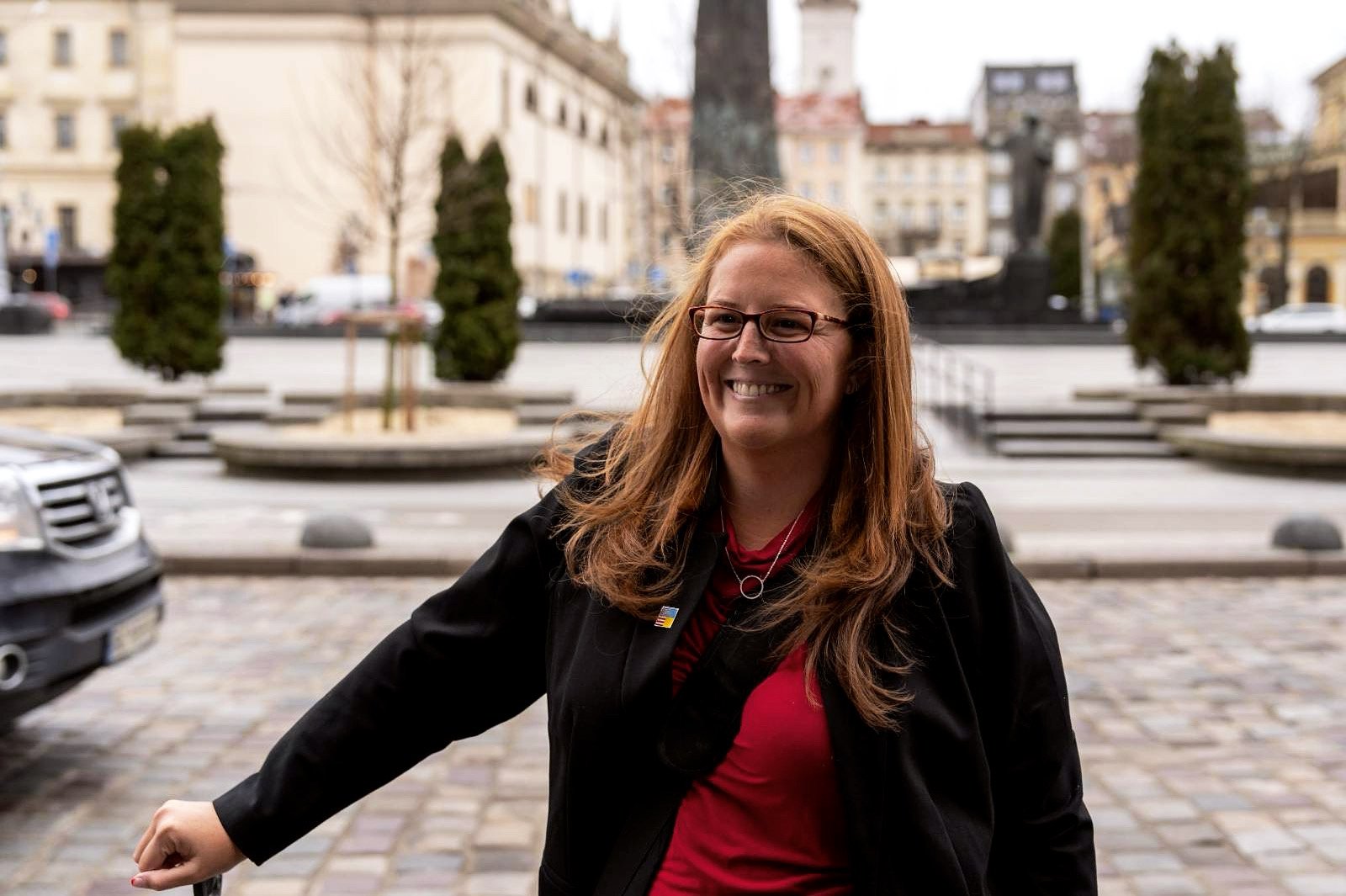It Was Always My Dream Job — Interview with Foreign Service Officer
Bryce Kincaid, Foreign Service Officer with the U.S. Department of State
What challenges do women face in diplomacy?
This was one of the topics of our Diplomacy Dialogues program — a biweekly event series at America House Kyiv that enhances your understanding of how American diplomacy operates in Ukraine and across the globe. Check out our schedule to join upcoming events in this series.
Our audience had the chance to chat with Bryce Kincaid and Julia Hozakowska from the U.S. Embassy about the specifics of their jobs in diplomacy, as well as to get some tips for those who are enthusiastic to pursue this career.
To gain even more insights and backstage stories, our intern Phoebe McChesney conducted an interview with Bryce Kincaid. Discover Bryce's journey into diplomacy, her decision to return to work in Ukraine following the Russian full-scale invasion, and gain some valuable tips for teens and young adults.
Bonus: At the end of the interview, Bryce shared her dog’s Instagram page, and he is adorable!
Photo: Bryce Kincaid
Phoebe: What are your major responsibilities as a diplomat?
Bryce: So within the Public Affairs Section, I manage the digital media team. We manage all of the Embassy and ambassador’s social media accounts across all platforms. Recently, we got permission to create a Telegram channel which was really important because most Ukrainians, we found, got their news from Telegram. And so we’ve added that new platform to our portfolio. But, I mean if you get into the nitty-gritty, it involves drafting tweets, working on high level visits, we put together videos for either important international days or Ukrainian days to show/amplify U.S. messages. For instance, if a Congressional delegation comes to town, we will follow and put together video just to share with American and Ukrainian audiences over the course of the day, what they did, who they met with, what was the purpose of their visit, what’s the message that they wanted to share. We also work with all other sections in the Embassy to get out their message because so many people are doing so many different things, not just the ambassador. And so we want to make sure all sections are being represented, and agencies. For instance, recently I worked with the Department of Energy as well as USAID. So, we just have a lot going on.
Photo: Bryce Kincaid
Phoebe: Have you always worked with public messaging and social media as part of your job?
Bryce: No actually, this the my first tour in this role. I did two tours as an OMS which is an Office Management Specialist where you kind of serve as the office manager for the office that you’re in. And then I did a consular tour in London. It was a split tour where one year was in consular and then one year I did staff aid to the ambassador. And then I did a year in Washington, D.C. with the Bureau of Intelligence and Research. It’s called INR. I was with INR Watch and now I’m here in Kyiv.
Phoebe: Why did you decide you wanted to work for the Department of State?
Bryce: Oh, it was always my dream job! Ever since I was in high school I was studying–I know this sounds so corny–I was studying AP U.S. History and I learned about just different agreements made between the U.S. and diplomats in especially the early 1900s leading up to the different wars and the roles that diplomats play and I was like, okay, I need to be in on that. I want that job so bad. So, it was always kind of my dream.
Phoebe: Awesome! And when you were in college, was that also something that you were persistent on pursuing?
Photo: Bryce Kincaid
Bryce: Yes! So in college I studied Political Science and English. And I realized even in Political Science–okay I love the role politicians play, they’re making policy. And then I went to grad school and I was like, hmmm maybe the UN–cause hybrid politician slash diplomat. And so then I went to law school. But in law school, right after law school, I got a job at the UN and I thought, oh my gosh this is the pinnacle of my career, I’ve made it. And then I was like, absolutely not. I do not like the UN. But yeah, it’s kind of always been in the diplomacy sphere, if you’d say.
Phoebe: What have you been most proud of with your work as a foreign service officer?
Bryce: Most proud of…ooh, I would honestly say, we move a lot. And especially, I’ve done now two back to back one-year jobs, or actually three. I would say the thing I’m most proud of is building a team around me and getting to know the people I’m working with, whether that be local or American colleagues. Because I’ve really learned that you have to really value the people around you and build on those strengths to highlight the strength of the entire team. And I think I would say I’m most proud of actually learning that lesson and knowing that and being able to connect with people.
Phoebe: What has surprised you the most about your work in the foreign service?
Bryce: How fast time flies. For instance, I previously served in Ukraine 2018 to December 2019 right before COVID and then I come back in September 2023 and it’s like everything has changed but nothing has changed and I’ve already been here now about seven months and time is just flying. But at every tour you think, oh I’m gonna have a whole year here or a whole two years and then you look back and you’re like, oh my gosh my tour is halfway over, time is flying, what’s happening? And then we’re always looking forward to the next tour, as well, and so you kind of always feel like you have one foot in the door and one foot out the door.
Photo: Bryce Kincaid
Phoebe: What’s particularly memorable about your work in Ukraine and why did you decide to return?
Bryce: What’s particularly memorable is even before the war in 2018, it was apparent how important Ukraine is as an ally to America. And the work was so important just because of how important of an ally they are. And even before the war we were working at an incredibly fast pace. And so I wanted to return, obviously because I strongly believe in the war effort. I believe in what Ukraine is standing for in fighting for their democracy and their freedom. And I just felt that it was really important to return and at least I could contribute in some small way and also even just be here for the local staff that are here working everyday to not only support their country but they’re also supporting American policy here.
Phoebe: What do you most enjoy about working abroad?
Bryce: So I never wanted like a day-to-day office job where every day is the same thing. And when you’re overseas, every day is completely different, especially in my job currently because we go out and staff the ambassador or the charge at every single event. And so you might be interacting with political interlocutors one day and then the Department of Energy the next day. You get to see all kinds of different agencies, all kinds of different partners and implementing partners, and all kinds of work that is being done in very different ways from think tanks to the Ukrainian government. And I love it because I feel like it gives us a fuller picture of what’s happening on the ground, how American support is being used, how policy is being perceived, and I just think it’s absolutely fascinating and I love that it’s fast paced and you learn so much.
Phoebe: Earlier you mentioned going on several tours. About how long is a tour and what is that experience like in terms of moving to a different place and getting adjusted to new cultures?
Photo: Bryce Kincaid
Bryce: I would say a standard tour is two years, especially when you’re entry level you can only do two years at a tour. Later on, you might be able to extend to three years if you want, at certain locations. They say when you arrive to a tour, you should plan on at least observing things for ninety days to six months and you shouldn’t just come in implementing change. So when you’re arriving to a new place, I think it’s really important to try and put your preconceived notions of how it’s going to be to the side and really learn and listen to the people in front of you and also observe the culture. I said I did a previous tour in London and everyone said, oh London it’s gonna be great. Even though we’re both English speaking, western leaning, pro-democracy cultures, it was a hard time breaking in even to the British culture just because of the different words they use. They have different connotations and different cultural context and it took a while to understand that and then make connections. For me, I function heavily on connecting with others and the easiest way, like I said, to do that is at first observe what’s happening, how people are connecting, where I can fit in, what I can learn, and then go from there.
Jefe the Havanese, Photo: Instagram
Phoebe: When you’re not working, what do you enjoy doing?
Bryce: Right now in Ukraine, we are working a lot more than we are not working. But obviously, in normal circumstances, I love, like I said, getting knee-deep into the culture that I’m at. I love regional travel. I love history. I also have a dog. He’s a Nigerian street dog from my first tour in Abuja, Nigeria. I run an Instagram account for him. I love training him, walking him. He’s like my ultimate best friend and so if I could I would spend every second with my dog. He even travels with me. I also love oceans, I try and go to every ocean and water, any bodies of water. So I would say, just mainly exploring with my dog. I read books too, but right now in Ukraine, unfortunately, I don’t have as much time for pleasure reading as I wish I did.
Phoebe: For people who might be interested reading the blog, what is the instagram account of your dog?
Bryce: @jefethehavanese. He was the biggest dog in his litter. His litter was essentially left on the side of the street in Nigeria and so all my friends and I in Nigeria ended up with these spoiled “diplo-dogs” as they’re so lovingly referred to and he was the biggest so I just called him “little boss” for a long time, but now he’s grown to encapsulate that mentality.
Phoebe: What advice, life and/or career, would you give yourself as a teenager or young adult?
Bryce: So, I’m gonna sound really old. But I graduated at a time when America was at an economic downturn and everyone was like, ah everything is collapsing. And there was a sense of dread I feel like. But, I think just stick at it. I did a lot of internships with different nonprofits and did a lot of networking to really learn and make sure what I would want to do and feel like I had a good understanding. So I would say first of all, stick with it. And eventually things will work out. Even after I graduated law school, for awhile I had to work as a nanny because it took awhile to find a job and get into the groove. So don’t give up. While I’m also telling you to take advice from other people–listen to your network, build your network, don’t be shy–don’t listen to the naysayers as well because plenty of people are like, oh that’ll never happen. Whatever, just get your 9 to 5. Even my own father for a long time was like, why don’t you just be a teacher, that’s a safer option and you’ll be here. But I say if you have a gut feeling of what you wanna do and you have an idea, absolutely stick with it and find other like-minded people who are more on the path of what you’re looking for and ask them for advice and how they did it. But don’t limit yourself. That’s my ultimate piece of advice.
Vocabulary List
Nitty-gritty (noun): Refers to a more thorough explanation
Delegation (noun): A group of representatives
Corny (adjective): Silly
AP (noun): Short for Advanced Placement classes in U.S. high schools
UN (noun): Short for the United Nations
Charge (noun): Short for charge d'affaires, the individual who takes over for an ambassador when the ambassador is abroad
Interlocutors (noun): People who speak with one another or mediators in a conversation
Knee-deep (adjective): To become immersed in something
Encapsulate (verb): To describe or encompass
Diplo-dogs (noun): Dogs belonging to diplomats
Get into the groove (idiom): To become adjusted to something
Naysayers (noun): People who are critical
ABOUT THE AUTHOR
Phoebe McChesney is a student at Oberlin College in the United States, majoring in Politics. She has interned in the U.S. House of Representatives and served as a Page in the U.S. Senate. Phoebe would love to work in Congress, with a federal agency, or on foreign policy and international relations one day. She is a blogger for her college and is interested in America House Kyiv’s Ukraine-American work.









